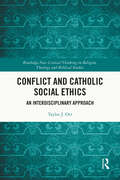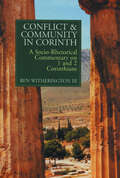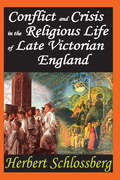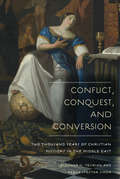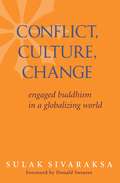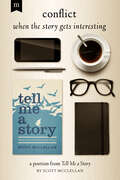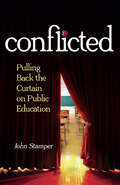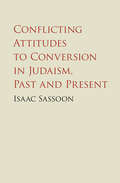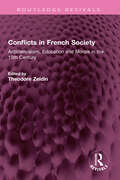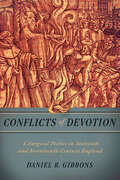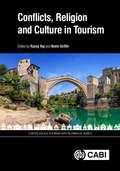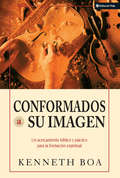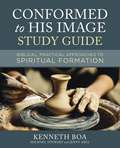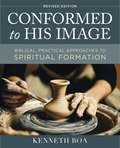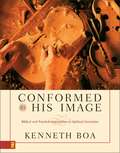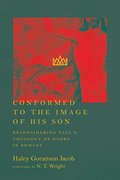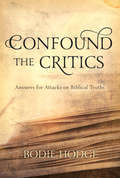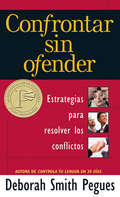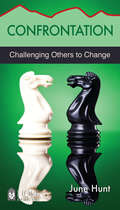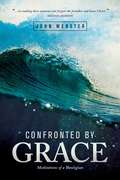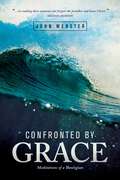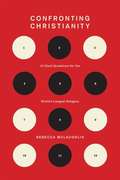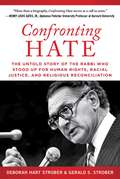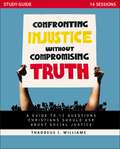- Table View
- List View
Conflict and Catholic Social Ethics: An Interdisciplinary Approach (Routledge New Critical Thinking in Religion, Theology and Biblical Studies)
by Taylor J. OttThis book focuses on the question of how to understand conflict and its place in Catholic and Christian social ethics. The author examines Catholic social teaching (CST) for its explicit mentions of conflict or contention and analyzes the way that CST addresses the subjects of peace, labor, and environment. While CST offers precedent to think about conflict within the frame of Catholic ethics, its lack of explicit engagement remains a major obstacle to a full, rich, and concrete understanding of the fabric of society and the work of social justice. Any social ethic that is not informed by the presence of conflict misses a major dynamic in society, and therefore leads to ethical judgements that are at best inadequate, and at worst, actively harmful. Building upon the insight of respected thinkers within Catholic social thought, this study is based on an interdisciplinary method that engages sociology, political theory, postcolonial theory, and intersectional feminist ethics. The book will be of particular interest to theological ethicists and those who work with modern CST.
Conflict and Community in Corinth: A Socio-Rhetorical Commentary on 1 and 2 Corinthians
by Ben Witherington IIIThis unprecedented commentary applies an exegetical method informed by both sociological insight and rhetorical analysis to the study of 1 and 2 Corinthians. In addition to using traditional exegetical and historical methods, this unique study also analyzes the two letters of Paul in terms of Greco-Roman rhetoric and ancient social conditions and customs to shed fresh light on the context and content of Paul's message. Includes 21 black-and-white photos and illustrations.
Conflict and Crisis in the Religious Life of Late Victorian England
by Herbert SchlossbergContrary to its popular image as dull and stodgy, the Victorian period was one of revolutionary change. In its politics, its art, its economic aff airs, its class relationships, and in its religion, change was constant. A half-century after Queen Victoria's death, it was said that she was born in one world and died in another. Th e most interesting and valuable studies of the period take the long view, as does Schlossberg, in his fascinating analysis of religious life in this period. For the Victorians, religion was not cordoned off from the push and shove of real life. Th e early evangelicals got off to a shaky start, beset by hostility, but the movement spread within the churches despite the suspicion in which it was held. Evangelicals, frequently called Puritans by those who opposed them, called for fundamental reforms in both the Church and the society; a social ethic was part of their program of religious renewal. Th eir moral sense explains the social activism of both Church of England Evangelicals and Dissenters, including the half-century crusade for the abolition of slavery. Schlossberg shows how religion in England dealt with such issues as science and the eff ect of German scholarship on religious thinking. Church history cannot simply be explained by its response to external forces as much as by the internal responses to those challenges. Th e nature of the religious enterprise itself, its theologians, clergy, lay people--like all people and all institutions--all responded with alternatives. Schlossberg helps us understand the Victorian period, as well as the increasing secularity of English life today.
Conflict, Conquest, and Conversion: Two Thousand Years of Christian Missions in the Middle East
by Reeva Spector Simon Eleanor TejirianConflict, Conquest, and Conversion surveys two thousand years of the Christian missionary enterprise in the Middle East within the context of the region's political evolution. Its broad, rich narrative follows Christian missions as they interacted with imperial powers and as the momentum of religious change shifted from Christianity to Islam and back, adding new dimensions to the history of the region and the nature of the relationship between the Middle East and the West.Historians and political scientists increasingly recognize the importance of integrating religion into political analysis, and this volume, using long-neglected sources, uniquely advances this effort. It surveys Christian missions from the earliest days of Christianity to the present, paying particular attention to the role of Christian missions, both Protestant and Catholic, in shaping the political and economic imperialism of the nineteenth and twentieth centuries. Eleanor H. Tejirian and Reeva Spector Simon delineate the ongoing tensions between conversion and the focus on witness and "good works" within the missionary movement, which contributed to the development and spread of nongovernmental organizations. Through its conscientious, systematic study, this volume offers an unparalleled encounter with the social, political, and economic consequences of such trends.
Conflict, Culture, Change
by Sulak SivaraksaFrom Nobel Peace Prize nominee Sulak Sivaraksa comes this look at Buddhism's innate ability to help change life on the global scale. Conflict, Culture, Change explores the cultural and environmental impacts of consumerism, nonviolence, and compassion, giving special attention to the integration of mindfulness and social activism, the use of Buddhist ethics to confront structural violence, and globalization's threat to traditional identity.
Conflict... When the Story Gets Interesting: A Portion from Tell Me a Story
by Scott McClellanAre you ever ashamed of the conflict in your story? Does your pride keep you from admitting when conflict is there? Conflict is a part of every story, and in fact, it is one of the ways God communicates with us through our stories. This short piece, taken from the book: Tell Me a Story by Scott McClellan, will talk through the conflicts we often face and speak truth we often forget in the midst of them.Our circumstances are an unreliable barometer for determining who God is and how He feels about us. Learn how to look at conflict in your life in a healthier way.Moody Collective Portions are short pieces of content taken from our full-length books. Our goal is to introduce our readers to a complete idea in a brief, concise, and inexpensive format. Most portions will take about 20 minutes to read.
Conflict... When the Story Gets Interesting: A Portion from Tell Me a Story
by Scott McClellanAre you ever ashamed of the conflict in your story? Does your pride keep you from admitting when conflict is there? Conflict is a part of every story, and in fact, it is one of the ways God communicates with us through our stories. This short piece, taken from the book: Tell Me a Story by Scott McClellan, will talk through the conflicts we often face and speak truth we often forget in the midst of them.Our circumstances are an unreliable barometer for determining who God is and how He feels about us. Learn how to look at conflict in your life in a healthier way.Moody Collective Portions are short pieces of content taken from our full-length books. Our goal is to introduce our readers to a complete idea in a brief, concise, and inexpensive format. Most portions will take about 20 minutes to read.
Conflicted: Pulling Back the Curtain on Public Education
by John StamperAt what point can a Christian teacher no longer be part of a public education system that requires them to participate in teaching destructive ideologies and advancing immoral agendas on young children? John Stamper reached that tipping point as a teacher in the Chicago Public School System and made the decision to quit his job and pull back the curtain on what’s happening in public schools today. You’ve seen the stories on the news – our national education system has an agenda, being implemented under the guise of fairness, equality, and racial justice to children. However, this book will open your eyes to: The indoctrination process through mandatory teacher training that implements these radical ideologies in schools without parental knowledge The danger and division created by critical race theory and gender theory being promoted in public schools How Marxist, socialist, and communist ideologies are dominating public schools, and how you move forward with homeschooling your children For generations, teachers have been excellent role models, investing their time and energy into fundamental lessons. However, today a growing number think they, the school board, and their school system know more than parents about what should be taught to students. You need to know what is going on in your child’s school and be prepared for the conflict of values that you may have to face. You have options.
Conflicting Attitudes to Conversion in Judaism, Past and Present
by Isaac SassoonEvidence suggests that conversion originated during the Babylonian Exile. Around the same time, biological genealogy was gaining popularity, especially among priests whose legitimacy was becoming increasingly defined by 'pure' pedigree. When the biological, or ethnic, criterion is extended to the definition of Jewishness, as it seems to have been by Ezra, the possibility of conversion is all but precluded. The Rabbis did not reject the primacy of genealogy, yet were also heirs to a strong pro-conversion tradition. In this book, Isaac Sassoon confronts the tensions and paradoxes apparent in rabbinic discussions of conversion, and argues that they resulted from irresolution between the two conflicting traditions. He also contends that attitudes to conversion can impact not only one's conception of Judaism but also on one's faith, as seems to be demonstrated by authors cited in the book whose espousal of a narrowly ethnic view of Judaism allows for a nepotistic theology.
Conflicts in French Society: Anticlericalism, Education and Morals in the 19th Century (Routledge Revivals)
by Theodore ZeldinFirst published in 1970, Conflicts in French Society is a detailed study of the social history of anticlericalism. Its four chapters, based on original research, reinterpret the causes and extent of some traditional conflicts in modern French society. In ‘The Conflict of Moralities,’ Theodore Zeldin investigates the confession to discover what sins and pleasures of daily life were revealed and repressed by it. This provides rare insight into sexual behaviour in nineteenth-century France. In ‘The Conflict in Education,’ Robert Anderson shows us how different the pupils of church and state schools really were and challenges the view that the two systems divided France into hostile camps. In ‘The Conflict in Politics,’ Austin Gough describes the way the church organized a political following, and how the Bonapartists fought back. In ‘The Conflict in Village Life,’ Roger Magraw studies popular anticlericalism at the local level and shows how ideology was far from being the major cause of it. In doing so, he provides an intimate picture of village life. This book will be of interest to sociologists of religion and educationists as well as to those wishing to understand the politics and morals of France.
Conflicts of Devotion: Liturgical Poetics in Sixteenth- and Seventeenth-Century England
by Daniel R. GibbonsWho will mourn with me? Who will break bread with me? Who is my neighbor? In the wake of the religious reformations of the sixteenth century, such questions called for a new approach to the communal religious rituals and verses that shaped and commemorated many of the brightest and darkest moments of English life. In England, new forms of religious writing emerged out of a deeply fractured spiritual community. Conflicts of Devotion reshapes our understanding of the role that poetry played in the re-formation of English community, and shows us that understanding both the poetics of liturgy and the liturgical character of poetry is essential to comprehending the deep shifts in English spiritual attitudes and practices that occurred during the sixteenth and seventeenth centuries. The liturgical, communitarian perspective of Conflicts of Devotion sheds new light on neglected texts and deepens our understanding of how major writers such as Edmund Spenser, Robert Southwell, and John Donne struggled to write their way out of the spiritual and social crises of the age of the Reformation. It also sheds new light on the roles that poetry may play in negotiating—and even overcoming—religious conflict. Attention to liturgical poetics allows us to see the broad spectrum of ways in which English poets forged new forms of spiritual community out of the very language of theological division. This book will be of great interest to teachers and students of early modern poetry and of the various fields related to Reformation studies: history, politics, and theology.
Conflicts, Religion and Culture in Tourism
by Razaq Raj Kevin A. GriffinConflicts, Religion and Culture in Tourism highlights the role of religious tourism and pilgrimage as a tool for improving cultural relations. Helping to form culture and society worldwide, faith plays a vital part in cross-cultural conflict resolution and opening dialogue across peoples. This book shows how faith and activism can respond to the common challenges of peace making and coexistence both within and among the world's many traditions. The book: - contains diverse empirical research insights on aspects of religious traditions, conflicts and challenges; - presents a range of contemporary case studies, across ancient, sacred and emerging tourist destinations as well as new forms of pilgrimage, faith systems and quasi-religious activities; - provides a global perspective, including contributions from Europe, Asia and the Americas. Conflicts, Religion and Culture in Tourism provides a timely assessment of the increasing linkages and interconnections between religious tourism and secular spaces on a global stage. Written from a multidisciplinary perspective, it provides an invaluable resource for those studying and researching religion, tourism and cultural management.
Conformados a su imagen: Un acercamiento bíblico y práctico para la formación espiritual
by Kenneth D. Boa¿Cómo se define una relación con Dios y cómo la podemos obtener? Es vital para los líderes de la iglesia tomar muy en serio esta interrogante para lograr respuestas más allá de las que ya no son suficientes. Vivir una vida recta, no solo pronunciar palabras elocuentes, debe ser nuestra respuesta. La calidad de nuestra relación con Dios es lo que influirá en nuestra salud, fortaleza y en el testimonio de la iglesia en un mundo cada vez más complejo y hostil.
Conformed to His Image Study Guide: Biblical, Practical Approaches to Spiritual Formation
by Kenneth D. Boa Jenny Abel Michael StewartHow can I know God better and, in the process, learn to live out my identity and calling? Too many readers finish a book or Bible study only to be left with unanswered questions about how they can actively and practically nourish their spiritual desires.Intended for use alongside the Conformed to His Image Video Study and as a complement to Kenneth Boa&’s highly regarded Conformed to His Image textbook, the Conformed to His Image Study Guide will help you formulate answers and engage in spiritual practices as you review key concepts and truths of what it means to conform to the image of Christ. Designed for use by independent learners, in small-group and church settings, or in college and seminary courses, this study guide will help you build your life on a biblical foundation, encapsulated in twelve facets of authentic Christian spirituality, which include:Relational Spirituality: Loving God Completely, Ourselves Correctly, and Others CompassionatelyParadigm Spirituality: Cultivating an Eternal versus a Temporal PerspectiveDisciplined Spirituality: Engaging in the Historical DisciplinesExchanged Life Spirituality: Grasping Our True Identity in ChristMotivated Spirituality: A Set of Biblical IncentivesDevotional Spirituality: Growing in Relationship with GodHolistic Spirituality: Every Component of Life under the Lordship of ChristProcess Spirituality: Process versus Product, Being versus DoingSpirit-Filled Spirituality: Walking in the Power of the SpiritWarfare Spirituality: The World, the Flesh, and the DevilNurturing Spirituality: A Lifestyle of Evangelism and DiscipleshipCorporate Spirituality: Encouragement, Accountability, and WorshipThe Conformed to His Image Study Guide is an invaluable tool for anyone who desires to follow Christ more closely.
Conformed to His Image, Revised Edition: Biblical, Practical Approaches to Spiritual Formation
by Kenneth D. BoaA Comprehensive, Balanced, and Applicable Guide to Spiritual Growth.What does a real relationship with God look like? What does the biblical vision of true spiritual life look like? How do we grow in spiritual maturity? How we answer these questions influence the health, potency, and witness of Christians in an increasingly complex and hostile world.Conformed to His Image answers these questions with clarity and insight, offering a comprehensive, balanced, and applicable guide to spiritual growth. Designed for use in college and seminary courses, this revised edition of the widely used textbook helps readers build their lives on a fully biblical perspective. It offers corrective to our tendency to pick and compartmentalize spiritual growth by exploring twelve facets of authentic Christian spirituality including:Relational Spirituality: Loving God Completely, Ourselves Correctly, and Other CompassionatelyParadigm Spirituality: Cultivating an Eternal versus a Temporal PerspectiveDisciplined Spirituality: Engaging in the Historical DisciplinesExchanged Life Spirituality: Grasping Our True Identity in ChristMotivated Spirituality: A Set of Biblical IncentivesDevotional Spirituality: Falling in Love with GodHolistic Spirituality: Every Component of Life under the Lordship of ChristProcess Spirituality: Process versus Product, Being versus DoingSpirit-Filled Spirituality: Walking in the Power of the SpiritWarfare Spirituality: The World, the Flesh, and the DevilNurturing Spirituality: A Lifestyle of Evangelism and DiscipleshipCorporate Spirituality: Encouragement, Accountability, and WorshipWith chapter overviews and objectives, questions for personal application, a glossary, and a list of key terms, Conformed to His Image provides a defining text for the student, pastor, and church leader of today and tomorrow. This revised edition includes new recommended resources throughout, more recent examples of subjects discussed, and updated wording to better reflect our postmodern context.
Conformed to His Image: Biblical And Practical Approaches To Spiritual Formation
by Kenneth D. BoaWhat does a relationship with God look like and how do we obtain it? It is vital for church leaders to grapple seriously with this question, for pat answers no longer suffice. Lives well-lived, not just words eloquently spoken, must become our response. The quality of our relationship with God is what will influence the health, potency, and witness of the church in an increasingly complex and hostile world. Designed for use as a college or seminary course, Conformed to His Image helps us build our lives on a fully biblical perspective. Exploring twelve approaches to Christian spirituality in depth, Dr. Kenneth Boa corrects our tendency to pick and compartmentalize. Pointing the way instead to an integrative, whole-life approach, Dr. Boa shows how each spiritual paradigm discussed is just one important facet in the gem of authentic and powerful New Testament living. With chapter overviews and objectives, questions for personal application, a glossary, and a list of key terms, Conformed to His Image will prove a defining text for the student, pastor, and church leader of today . . . and tomorrow. 12 Facets of the Complete Christian Life Relational Spirituality: Loving God Completely, Ourselves Correctly, and Others Compassionately Paradigm Spirituality: Cultivating an Eternal versus a Temporal Perspective Disciplined Spirituality: Engaging in the Historical Differences Exchanged Life Spirituality: Grasping Our True Identity in Christ Motivated Spirituality: A Set of Biblical Incentives Devotional Spirituality: Falling in Love with God Holistic Spirituality: Every Component of Life under the Lordship of Christ Process Spirituality: Being versus Doing, Process versus Product Spirit-Filled Spirituality: Walking in the Power of the Spirit Warfare Spirituality: The World, the Flesh, and the Devil Nurturing Spirituality: A Lifestyle of Discipleship and Evangelism Corporate Spirituality: Encouragement, Accountability, and Worship
Conformed to the Image of His Son: Reconsidering Paul's Theology of Glory in Romans
by N. T. Wright Haley Goranson JacobWith its soaring affirmations and profound statements of salvation in Christ, Romans 8 is a high point in Pauline theology. But what does Paul mean when in 8:29 he speaks of being "conformed to the image of his Son"? Remarkably, there has been little scholarly attention awarded to this Pauline statement of the goal of salvation. And yet in Christian piety, preaching, and theology, this is a treasured phrase. Surprisingly, its meaning has been variously and ambiguously expressed. Is it a moral or spiritual or sanctifying conformity to Christ, or to his suffering, or does it point to an eschatological transformation into radiant glory? In Conformed to the Image of His Son, Haley Goranson Jacob probes and reopens a text perhaps too familiar and a meaning too often assumed. If conformity to the image of the Son is the goal of salvation, a proper understanding is paramount. Jacob points out that the key lies in the meaning of "glory" in Paul's biblical-theological perspective and in how he uses the language of glory in Romans. For this investigation of glory alone, her study would be valuable for the fresh understanding she brings to Paul's narrative of glory. But in introducing a new and compelling reading of Romans 8:29, this is a study that makes a strong bid to reorient our understanding of Paul's classic statement of the goal of salvation.
Confound the Critics: Answers for Attacks on Biblical Truths
by Bodie HodgeCan be enjoyed by anyone from skeptics to Christians to scholars Replies to actual attacks from newspaper articles, blogs, debate boards, DVDs, and other sources Short, powerful responses to strengthen faith and develop a greater respect for God's Word! Ever been asked "Can God create a rock so heavy that He cannot lift it?" Your reply is a great opportunity to help someone receive clearer understanding of who God is and perhaps even help lead him or her to Christ. Insights like this are what make this book so unique compared to other resources. Whether you want to witness more effectively or give someone seeking truth a resource that will help, Confound the Critics is the perfect choice! And the big rock question? Make sure they are asking about the God of the Bible and remind them God isn't bound to the laws -- like gravity -- of the universe He created!
Confrontar sin ofender
by Deborah Smith PeguesDeborah Smith Pegues muestra claramente cómo la confrontación, cuando se lleva a cabo bien, puede ser una herramienta poderosa a la hora de arreglar las relaciones deterioradas y para el crecimiento personal. Deborah Smith Pegues draws on God's Word, personal experience, and research to show how to approach difficult situations so relationships are strengthened not broken.
Confrontation: Challenging Others To Change (Hope for the Heart)
by June HuntDo you need to confront someone who is doing something wrong? It can be awkward, even a little risky, but confrontation for the purpose of exposing what is wrong to establish what is right is biblical. In this Christian book, June Hunt, shows you how to confront someone for the purpose of conviction, correction, and a changed life. Christian counselor, June Hunt begins this minibook with a definitions section where she explains God's heart on confrontation. Learn the 5 methods of confrontation used within the Bible, discover the difference between hostile and assertive confrontations, and find out 4 common confrontation styles, which will help you realize whether you respond in a healthy way to confrontation or run away from it out of fear. June explains the characteristics of confrontation, indicating when you should and when you should not confront someone. She provides 4 proven confrontation strategies and provides examples and illustrations of appropriate/inappropriate ways to confront people. Features the 11 "commandments" of confrontation backed by scripture, covering topics such as respect, listening to others, guilt, and more. It includes--• 3 spiritual steps to use when confronting others• A self-evaluation checklist to follow to make sure you are personally prepared for God-centered confrontation. • How to use the "sandwich" technique to bring about positive change. • Over 20 Do's and Don'ts related to healthy goal setting for confrontations. • The difference between constructive and deconstructive confrontation. • How to have a "crisis confrontation" for loved ones with chronic problems• Answers common questions related to tough confrontations, such as How do I respond to someone who reacts defensively or with anger when confronted?"
Confronted by Grace: Meditations of a Theologian
by John WebsterIn this rich collection of sermons, John Webster considers the power of the gospel and the truth of God's grace. Born from years of theological and biblical study, these reflections serve to challenge, stimulate, and inspire, demonstrating the grace of God at work in the complexities of life. By pointing us toward Christ, Confronted by Grace helps us grow in our understanding of the truth of the gospel.
Confronted by Grace: Meditations of a Theologian
by John Webster"I found myself joining in his joyful 'Amen!' to all of the promises that we have in Jesus Christ." --Michael Horton In this rich collection of sermons, John Webster considers the power of the gospel and the truth of God's grace. Born from years of theological and biblical study, these reflections serve to challenge, stimulate, and inspire, demonstrating the grace of God at work in the complexities of life. By pointing us toward Christ, Confronted by Grace helps us grow in our understanding of the truth of the gospel.
Confronting Christianity: 12 Hard Questions for the World's Largest Religion
by Rebecca McLaughlinAddressing 12 controversial issues about Christianity--the Bible's teaching on gender and sexuality, the reality of heaven and hell, and more--this book shows how current psychological and scientific research actually aligns with teaching from the Bible.
Confronting Hate: The Untold Story of the Rabbi Who Stood Up for Human Rights, Racial Justice, and Religious Reconciliation
by Deborah Hart Strober Gerald S. StroberIn this biography, Gerald and Deborah Strober draw from original source materials and numerous interviews to detail the life and career of the esteemed Rabbi Marc Tanenbaum, a seminal 20th century figure in interfaith relations in the US and around the world. From his position as Director of Interreligious Affairs at the American Jewish Committee, Rabbi Tanenbaum was deeply involved in the historic Vatican II Council, which promulgated a landmark encyclical on Catholic-Jewish relations. Rabbi Tanenbaum also was one of the few Jewish leaders who worked closely with Reverend Billy Graham and other evangelicals. He worked tirelessly as a civil rights activist and was active in the cause of Soviet Jewry, as well.Confronting Hate details this esteemed career and his interactions with the likes of television legends Norman Lear, Don Hewitt, and Franco Zeffirelli; Jesse Jackson; Martin Luther King, Jr.; and several US presidents, from Dwight D. Eisenhower to George H.W. Bush. This book leaves no stone unturned in covering the public and private aspects of the life of “the human rights rabbi.” The authors bring to light the immense international influence that Rabbi Tanenbaum has even today, more than twenty-five years after his passing.
Confronting Injustice without Compromising Truth Study Guide: A Guide to 12 Questions Christians Should Ask About Social Justice
by Thaddeus J. WilliamsEnacting social justice is essential to the Christian faith. But the Bible's call to seek justice is not a call to superficial activism. True justice requires biblical wisdom and communal discernment.Maybe you're frustrated with a version of Christianity that doesn't seem to take justice seriously. Perhaps you've witnessed the rise of ideologies that brand themselves as 'social justice,' but you have a sense that something is off about them. Maybe you have a hunch that God offers a better way to do justice than what's offered by the snarky memes on our news feeds.In this 14-session, video-based study guide, teacher and lecturer Thaddeus Williams furthers the case he made in his book, taking study groups and individuals deeper into complex question of how to pursue a path of justice without compromising the truth of the gospel.Participants will watch video segments (DVD/streaming video sold separately), hear from a diverse range of experts, interact in group discussions, and answer personal reflection questions to discover what the Bible and the example of Jesus have to teach us about justice.Williams confronts religious and political tribalism and challenges participants to discover a compelling vision of justice for all God's image-bearers that offers hopeful answers to life's biggest questions and a way forward.Sessions Include:What is Social JusticeThe God QuestionThe Imago QuestionThe Idolatry QuestionThe Collective QuestionThe Splintering QuestionThe Fruit QuestionThe Disparity QuestionThe Color QuestionThe Gospel QuestionThe Tunnel Vision QuestionThe Suffering QuestionThe Standpoint QuestionConclusion
